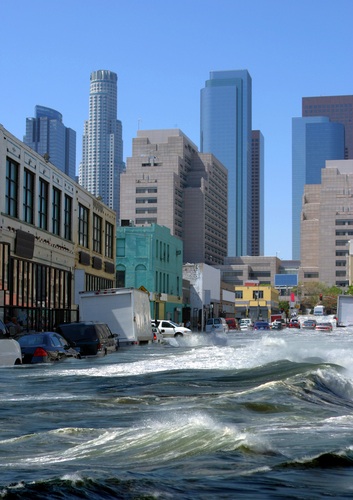
- Despite President Obama’s plea to the Copenhagen climate summit (“While the science of climate change is not in doubt, I think our ability to take collective action is in doubt right now, and it hangs in the balance”), it is looking more and more like the philosophical differences and logistical squabbles between the developed and developing worlds are too large of an impasse for a new global carbon emission-cutting accord to come out of Denmark.
- AM Best has affirmed “A” ratings for the AIG subsidiaries (Chartis, Lexington, AIU and Yosemite), which were downgraded from “A+” in September 2008 as the world economy burned down. “Best Analyst Jennifer Marshall said the rating reflected the fact that the companies had enough capital available to support their risk exposures, showed better underwriting and operating performance, and retained the bulk of their policies and customers around the world. ‘It is still an excellent rating, and we believe that, based on our analysis of the capitalization, the rating is appropriate,’ said Marshall.”
- Since LED lights use some 90% less electricity than the traditional incandescent variety, many cities and towns throughout the country have installed LED traffic lights in recent years to save money and become more environmentally conscious. Great idea, right? Maybe not so much once winter hits. It turns out that the extra energy radiated by the traditional lights was what melted snow landing on the lights and blocking the signal. So many of the lights using the LED alternative now become unreadable during major storms. Related accidents have been reported in Indiana, Iowa and Minnesota, and a cop responding to a traffic accident in Oswego, Illinois, had this to say: “Would the accident have occurred if the lights had been clear? I would be willing to bet not.” There is currently no good solution to this clear and deadly (from at least one report) public safety concern, but different cities are trying different things until they get the opportunity to implement a better technological fix, which could include heated lights, water-repellent coating or weather shields. St. Paul, Minnesota, has its workers using compressed air to blow the snow off while Green Bay, Wisconsin, is sending crews out to brush the snow off by hand. I don’t know if this extra effort will completely offset the electricity savings (which the state of Wisconsin reports as $750,000), but it sure does sound like a tedious process. And cold.
- The Dubai Ports controversy a few years back brought the debate about national security vs. foreign investment to the forefront. Now, with the Obama administration recently threatening to block a Chinese bid to buy a Nevada gold mining company, it seems the debate continues. While the Times piece is good, check out the Risk Management take on the issue from late 2008 if you’re looking for a more in-depth look at the risk-related angle here.
- Netflix is facing a potentially huge breach-of-privacy law suit that could be financially devastating for the company. But for the rest of us? It may actually help clarify some of the still-murky legal issues surrounding these new, user-centric, online social networks.
- This is a few days old, but I’m just reading this Justin Fox’s “The Real Jobless Rate” column from this week’s Time (which also has a pretty good “Year in Pictures” feature, by the way). Fox suggests that while November’s reported 10% unemployment rate is a useful barometer of the current recession, there are many other, more nuanced jobless measures out there to better illustrate the true gravity of the current recession. What measures should we be looking at? “How about the simplest possible job-market measure, the employment-to-population ratio? Among Americans ages 25 to 54, it was at 75.1% in November, down from 80.3% in early 2007 and — with the exception of October’s 75% — the lowest it’s been since 1984. Because of the entry of women into the workforce, the ratio trended upward from the 1960s through the 1990s. If you look just at men ages 25 to 54, the picture is much more dire. Their employment-to-population ratio of 80.6% in November is the lowest since the BLS began keeping track in 1948. It’s 4 percentage points lower than it was in the depths of the early-1980s downturn.” In the comments below Fox’s article, someone linked to Paul Krugman’s take on the matter, which I found it interesting as well.
- This is similarly a few days old but probably even more interesting: Paul Volcker speaks to the Wall Street Journal on moral hazard, a fundamental restructuring the banking sector and the financial “innovation” of the past few decades so-often touted as a key driver of the U.S. economy. “The most important financial innovation that I have seen the past 20 years is the automatic teller machine. That really helps people and prevents visits to the bank and is a real convenience. How many other innovations can you tell me that have been as important to the individual as the automatic teller machine, which is in fact more of a mechanical innovation than a financial one?”
- The social media site Twitter was knocked offline last night by what may have possibly been an Iranian group of hackers calling themselves “IRANIAN CYBER ARMY” hijacking the site for political motivations. The digital assailants left a written message accompanied by a green flag on Twitter.com when the site went down that included the warning that “U.S.A. Think They Controlling And Managing Internet By Their Access, But THey Don’t, We Control And Manage Internet By Our Power” as well as the oddly polite salutation “Take Care.” Some are skeptical that this is really an Iranian political group rather than merely a prank, but as we saw this Summer, Twitter has had a major role in the ongoing in-fighting taking place in Iran. “Twitter has been an important tool for the opposition movement in Iran this year. Following the disputed presidential election there in June, as the country’s government sought to contain mass protests on the streets and online, threatening messages started to appear on the site from at least one user who claimed to be part of a cyber-unit of the country’s Revolutionary Guards Corps, established to fight enemies of the government.”
Find an interesting link? Email me any stories, videos or images you come across and would like to see included. Or just follow me on Twitter @RiskMgmt and pass it along that way.




